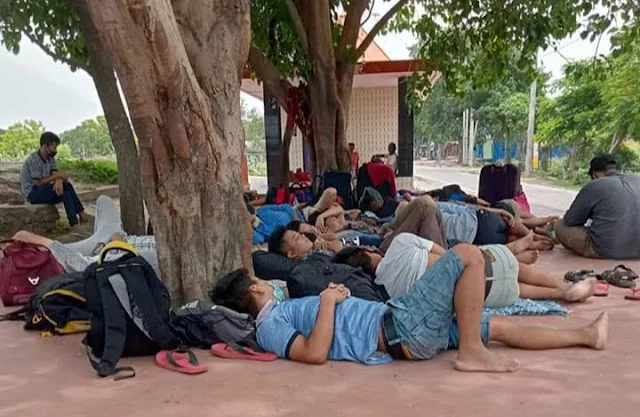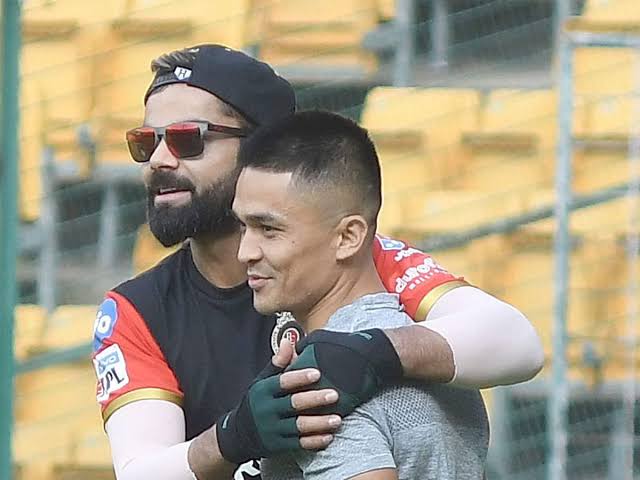Dinner nights scare Jitu Rai. He can make eating in front of people sound like the silent moan of American ladies of the hoopskirt era who nibbled on only a few morsels quietly and measuredly, because the only priority in public dining in those Civil War times, was to look elegant. Jitu didn’t need to fit into tight corsets like those poor little rich women wretchedly weaned away from hogging. But formal sit-down army lunches and dinners always ended up in the soldier returning to the empty mess a few hours later to chomp on a second helping of his favourite chicken.
 |
| J itu Rai, soldier of 11 Gorkha Rifles is considered India’s biggest bet for an Rio Olympic medal |
Yatin Bhatkar, operations head at OGQ, his funding and facilitating sponsors, remembers one such lunch arranged by the Commandant of Mhow’s Army Marksmanship Unit, Col Lalit Sharma. “Jitu told me people speak in posh English and eat so little at these dos. And you’re expected to be polite and listen to others when they talk. Everyone ends up eating much less,” Bhatkar recalls him explaining. Jitu would call him a few hours later to report gleefully how he had polished off a heaped plate of tandoor murg, in his second hearty lunch sitting alone.
It was also Jitu Rai’s second chomp at success at Mhow and as an international marksman – he was packed off to his unit in Lucknow when he stagnated as a pistol shooter a few years ago. Heading into Rio, the 28-year-old soldier of 11 Gorkha Rifles is considered India’s biggest bet for an Olympic medal, though Bhatkar jokes he will have to persuade the shy jawaan to bite into the medal in full public view. He first sensed growing assuredness in the young man earlier this summer, when Jitu had confidently strode towards the dessert counter of the breakfast table at a city hotel without hesitation. “Arre tum log itna sa khaata hai,” he would mock complain, as he attacked the pastries guffawing at Bhatkar who considers Jitu an Olympics-bound athlete like no other he’s ever seen before.
Accustomed to Indian sportspersons’ sighing about lack of support, Bhatkar believes his non-profit fuelling Olympic dreams, has run into an outlandish man who has to be coaxed and cajoled to ask for help. The first time OGQ approached him, Jitu had asked fellow shooters Gagan Narang and Vijay Kumar why exactly would someone support him. He had also wondered how some blokes wearing shorts and sneakers could help him transform from being a shooter who made World Cup finals to someone who began winning those finals. “He’s used to the armed forces etiquette and formality. The first thing he told us was he’d expected someone wearing coats to turn up to help him,”
Bhatkar recalls. Chalking out a training programme in a coffee shop – and not an airconditioned corporate office with stuffy suits – was too much for his imagination in late 2013. “Vijay had to convince him to accept help.”
Not much has changed for India’s most consistent world-class shooter with 7 World Cup medals and podiums at every single elite championship he’s participated in – CWG, Asian Games, World Championships. Jitu still believes it’s mandatory to inform his benefactors and army seniors as soon as he reaches a new international city. He will politely ask for permission to check into a hotel room if there’s an overnight stopover at Frankfurt, and still ask “Are you sure?”
He needed a sports watch, worth Rs 6000 to time himself between shots after he’d returned from medalling at Asian Games and CWG in 2014. “But how can I ask you for it? How will you know whether it is useful to me or not if the coach hasn’t told you I need it?” he would quiz his befuddled backers. Taking a liking to a slightly expensive cycle to unwind after a hard day’s training shoot, he would agonise about it for days and ultimately put his life’s savings into buying it himself. It would take the Mumbai office three weeks to convince him to send across the bill from Indore to reimburse. He would first sheepishly tell them that he’d fallen for a cycle that was ‘thoda mehenga.’ Then he would ask how could he submit a bill if it’s not shooting equipment. Then he argued that there were cheaper cycles worth Rs 8000 in the market, but he had really fallen for a slightly costlier one. “I had to explain to him that he’s an elite athlete of India,” Bhatkar recalls.
Last heard, he had finally accepted a laptop to analyse his scores on the SCATT systems after months of running away from the expensive purchase.
Returning from a World Cup triumph once, Jitu Rai would miss his flight from Delhi to report to Mhow, stuck in the capital’s traffic for 2.5 hours. He would blame himself for not factoring in the time in that smoky snarl and end up booking his own tickets – last minute bookings that would set him back by a lot. “When we got through to him, he said as an Indian Army man he ought to have estimated the precise time. Petrified of missing flights ever since, Jitu will reach airports at 5 am for a 9.30 flight. He said it was his mistake and remained adamant to not accept a reimbursement. Where do you find such people nowadays?” Bhatkar wonders.
This one was found in Sankhuwa Sabha district in Nepal, though at the moment his family stays in Itahari, a city located in the Koshi Zone (south-eastern Nepal). Jitu’s mother Lily Maya Rai recalls an uneventful childhood of her now-famous son – always an introvert, spoke very little and never liked visiting relative’s homes. “He was a very good boy. Everything that he did, he would make sure it is done well and is complete,” she says, adding there was never much time for games. “He used to go to school and get back home and start off with other work on the field – cutting grass.
“Living conditions were all good till his father was still alive. Everything was alright. But then…” she trails off.
Jitu Rai had also cracked the British Army (Originally, there were four British Gorkha regiments which were amalgamated to form The Royal Gurkha Rifles in 1994 ) when he learnt of openings in the Indian army. “His friends were keen on India, so he also gave it a try and got through,” she says. The boy had seen hardship in his life, and the British army would’ve paid him more and given him British citizenship. None really knows why the lad chose the Indian army, though it might have something to do with continuation of loyalty from his father who might’ve served in same regiment, though sketchy details are known.
Jitu’s brother Bhanu Ghale though, recalls a few sporting honours from school. “There was always work to be done in the field. But there were a few games; Jitu liked playing Kabbadi and high jump. He even won an award in school called ‘Birendra Sheel’, named after the then King Birendra Bir Bikram Shah Dev,” he recalls. Four of his brothers (there’s also one sister) would leave the country to find work in Dubai, Qatar and Malaysia, though all have since returned. Independent, hardworking and confident he always was, but what surprised the family was how he was willing to spend a lot of money from his own pocket initially to fund his sporting dream. “Earlier we thought, he was just going to be like any ordinary person from Nepal who goes to India to work. However, later we found out that he was using his own money to build his shooting career and do something different. Then we started hearing of his gold medals,” he adds.
It shouldn’t surprise anyone that a Gorkha — known to be excellent marksmen — is primed to win India one of its shooting medals at Rio. “Gorkhas came to India as conquerors in 1790s,” says Madhu Gurung, who’s penning a tome on the history of the regiment illuminating everyday lives of these hardy, brave, martial people. Having captured Kumaon, and passing Garhwal kingdom onto Dehradun where they’d fight the Anglo-Nepalese Wars, the Gorkha realm once spanned from Sutlej to Sikkim. The Brits began recruiting them in 1815, and Gurung notes how over 4 lakh of them would fight in the World Wars. “Jitu would’ve come through more or less the same system of Dallawaalahs who go recruiting to various localities in Nepal,” she adds.
In its 100th anniversary of the first of Anglo-Nepalese wars at Khalanga — considered a mournful British victory because it was as devastating as a loss — Jitu Rai is poised to hit bullseye and reprise the great marksmen skills of Gorkhas. Major-General Rollo Gillespie, who led the attacking troops, is said to have been shot through the heart by a sharp Gorkha sniper, though the brave resistance had come with mere khukris and a few muskets.
The Indian Army waits for another Gorkha to shine on August 6 & 10 with bated breath —a hundred years on.
nnn
It’s always a marathon siege – the 50m free pistol event. Most Indians will tune into the Deodoro ranges in Rio when Jitu fires 60 shots in this long drawn gun-athon; considered pistol’s classical contest in precision. But few will appreciate what it takes to win the short barrel, heavier pistol show.
Imagine a very small target like in rifle, but shot with one hand. Like college marks in humanities, these scores tend to be lower. Not the high 90 percentile to feel exhilarated, a 565 / 600 would do just fine. The wind and the sun and the universe can conspire to make life difficult, and unlike the rifle which is largely about taming the weapon and the equipment, free pistol is about steely skill.
Pistols don’t offer the same stability of rifles, and are severely subject to ballistics – the handling, the support, air temperature, air speeds and weapon temperature. Quite simply, they are difficult beasts to be spot on with. Gun accuracy, they say, is an art few comprehend. In this, the army has done its best to give their man the best possible contraption. He flew down to the Morini factory Switzerland last year, there was a miniscule change in Jitu’s grip which was customised at Francesco. It took into account the anatomical structure of his palm and the contours of his hand – the finger that would pull the electronic hyper-sensitive trigger, reacting to that snap-connect between brain to nerve to finger.
‘‘It is about the ability to repeat the same performance over and over again,’’ explains former international Ashok Pandit. ‘‘Everyone knows how to shoot inner 10s, but you need to be patient to keep repeating it,’’ he says. It’s not a marathon for nothing. Jaspal Rana, India’s first pistol king, talks of the event needing a steady personality. ‘‘You should be able to stay where you are. It takes humility to repeat the same thing,’’ he philosophises.
It isn’t just the noise of guns going off by the opponents standing alongside you that you are trying to cope with but occasionally, you are fighting the crowd as well. In 2014 Asian games, where he won the gold at 50m, Rai was also in contention in the 10 m event when he lost his rhythm, as the crowd started cheering after an opponent aced the maximum score of 10.9. Rai lost his rhythm, and didn’t have enough time to regroup as the 50-second time limit ran out. He had to forego that shot and ended up with the bronze medal.
Alexander Melentyev held the world record in free pistol for 34 years – 581 / 600 – broken only at Granada in 2014 by Jin Jong-oh, where Jitu won silver. Pandit recalls shooting 558 at SAF Games for gold and being deliriously happy. ‘‘Indian standards were miserable. Jitu’s changed free pistol in India,’’ he says, with his added temperament for finals. At the highest stage, at the loftiest meets – Jitu Rai has gotten the job done.
The 50’s where the drama of the opera is – Jitu Rai could well become the first Indian to pick two medals in a single Olympic if he can also go the distance in 10m air pistol – where his scores aren’t too shabby either.
Abhinav Bindra has spoilt Indian shooting fans by laying bare for them a thousand shades of torment, a dozen signs of discomfort and the acutest of agonies suffered in pursuit of that 2008 gold medal, through his epic tome A Shot at History penned by word-maestro Rohit Brijnath. The book, though, sets you up for spectacular disappointment when you attempt to run the slivers of the Jitu Rai story through the same fine sieve of intensity. Bindra’s single-minded pursuit of an encore at Rio meant he returned from a test event at the host city earlier this summer, a tad ‘‘bored’’ at the sight of Christ the Redeemer.
On his arrival in Rio, Jitu would go and strike a Titanic pose in front of the imposing Landowski sculpted masterpiece of Jesus with outstretched hands. Complete with a goofy grin.
That’s chalk and cheese and soapstone and reinforced concrete — all manners of genius in dazzling white that’ll be present at the Olympics in Brazil.
It’ll be silly to think Jitu Rai doesn’t feel pressure – though he’ll never go about deconstructing it, he’d rather watch Bollywood comic capers and make you look silly for worrying – it’s just that he masks it well, chatting and walking around easy just before he’s shooting.
Viren Rasquinha of OGQ deals with a dozen shooters and has stacks of papers that detail how many of them compulsively change stance, technique, equipment – a thousand different screws, absorbers and accessories. ‘‘Jitu won’t bother about old foreign coach or new barrel and such other things. He believes in his own technique and way of training. There’s very little experimentation, it’s steady,’’ he states.
Until 2012 nobody knew Jitu Rai, and till 2014 Jitu Rai didn’t know Olympics was a big deal. He wasn’t star struck receiving an award once from Kapil Dev, and nodded obliviously as three-time Olympic champion Ralf Schumann held fort in English on succeeding. His happiest memory of the Arjuna Award ceremony was that his mother was flown down to Delhi, and enjoyed wearing footwear for the first time in her life.
There’s stage fright common to both luminous shooting stars – fright of the yakking on stage variety, but unlike Bindra who aced it in the end, Jitu doesn’t mind bumbling through it. He was told he’d be required to speak at a recent send-off function. ‘‘Maine room pe practice kiya ye boloonga, wo boloonga. Gurpreet saab ko stage pe dekha aur darr gaya. Upar jaake kadak ho gaya, main sab bhool gaya. Thank You kehke waapis aa gaya,’’ he would later say.
Uncharacteristically last May, Yatin Bhatkar got a frantic call from Jitu. ‘‘Sir, main English course karu kya,’’ the shooter would blurt out. ‘‘Haan karo, lekin tension nai hai. Aapko English mein shooting nai karna hai,’’ he was reassured. In a few day’s time, the rustic storm in the Earl Grey teacup had blown over after Jitu Rai walked upto Bhatkar and told him, ‘‘Sushil Kumar bhaisaab bhi Hindi mein baat karte hai.’’
It’s why the plethora of advice coming his way – mostly in English – amuses him, though he nods politely. Untroubled, unworried he’s the un-Bindraest of them all. Whether this de-complication brings him golden succeeds or not remains to be seen. Coaches were once attempting to explain to him to shut his mind off scores of other shooters as they flashed on the three screens during finals, to avoid them from distracting him. ‘‘Lekin announcement bhi hota hai,’’ he would pipe up. It’s not like shutting his eyes would change the scores, he’d think. Best to just see and be done with it. A mental trainer knew that day, his expertise meant not a thing to Jitu Rai.
Via indianexpress





